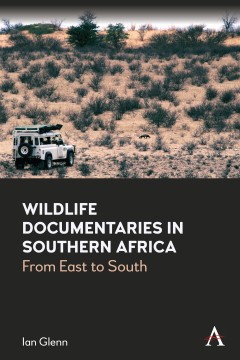Wildlife Documentaries in Southern Africa
By Ian Glenn
Other Formats Available:
- About This Book
- Reviews
- Author Information
- Series
- Table of Contents
- Links
- Podcasts
About This Book
This study examines why the Kruger Park struggled to become a leading venue for wildlife filmmaking and then, paradoxically, at a time when South Africa came under increasing political and military pressure, wildlife filmmaking took off very successfully. Another paradox is that the growth in wildlife filmmaking also paralleled the growth of wildlife hunting in Southern Africa.
The study turns to Actor-Network theory to examine the complex interplay between local filmmakers, international commissioning agents like Mike Rosenberg, international broadcasters and the animals involved. It argues that Southern African filmmakers were often able to aim successfully both at European and North American markets and points to ways in which innovations from Southern Africa influenced broadcasting trends internationally, particularly in the move away from a British blue-chip BBC ethos and style.
It concludes with an examination of Africam and WildEarth and the vision of founder Graham Wallington about the future of wildlife documentary.
Reviews
This is a vividly written and innovative book on wildlife filmmakers in southern Africa. Ian Glenn explains how they emerged at the top of their field globally, were awarded Emmys and Golden Pandas, and reached a mass audience. He celebrates their contribution to a sympathetic understanding of wild animals and to environmental conservation. –- William Beinart, Emeritus Professor, St Antony’s College, University of Oxford, UK.
Ian has done an excellent job of finding the gems in thousands of sources to capture the essence of wildlife filmmaking, a strange intangible blend of science and art, intuition and discipline, and most of all a profession with profound passions to save the planet. Dereck Joubert.
A wildlife adventure like no other – not solely in media studies, zoology or literature. This is a work of recovery, review, and restitution. It ’is a theoretical game-changer, told from the perspectives of the filmmakers themselves. Readers are taken on a rollicking safari that redefines documentary film theory. The real analysis is in the backstories, the paper trails, and in the decision-making networks. – Keyan G. Tomaselli, University of Johannesburg, and recipient of the ‘Heroes and Legends Award, and Simon ‘Mbunu’ Sabela Awards.
"Wildlife Documentaries in Southern Africa explores a vast and neglected terrain within the field of wildlife documentary studies. Glenn's Polemical approach and enthusiasm for archival adventure not only broadens our understanding of the ecology of wildlife filmmaking, but it also emphasizes the significance of these films in Southern African screen cultures.” – Dr. Ian-Malcolm Rijsdijk, Senior Lecturer, Centre for Film and Media Studies, University of Cape Town, South Africa.
In Wildlife Documentaries in Southern Africa, Glenn has given us a fun read and much-needed inspiration for future research. The public and scholars from across a range of disciplines are going to find in this book wonderful stories and excellent ideas. - South African Journal of Science
Author Information
Ian Glenn is Emeritus Professor of Media Studies at the University of Cape Town and the author of First Safari: Searching for Francois Levaillant.
Series
Table of Contents
Introduction: The social, political and technological background; Chapter 1: The Kruger and the politics of conservation; Chapter 2: Catching rhinos: from Ian Player to John Wayne; Chapter 3: East to South: why African wildlife filmmaking moved from East to Southern Africa; Chapter 4: Alan Root in Kenya and the Bartletts in Southern Africa; Chapter 5: Michael Rosenberg and cultural brokering; Chapter 6: David and Carol Hughes; Chapter 7: Dieter Plage and South West Africa; Chapter 8: John Varty and the role of the private lodge; Chapter 9: Technology transfers and local innovations; Chapter 10: The new millennium: Kim Wolhuter, the Jouberts and Mad Mike and Mark; Chapter 11: The future of the genre?: WildEarth television and the attractions of wildlife live; Conclusion.
Links
Stay Updated
Information
Latest Tweets



